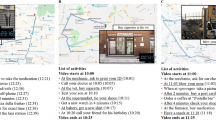Abstract
The present study aimed at investigating age-related differences in prospective memory performance using a paradigm with high ecological validity and experimental control. Thirty old and 30 young adults completed the Dresden Breakfast task; a meal preparation task in the lab that comprises several subtasks including event- and time-based prospective memory tasks. Participants were required to plan how to perform the task. Results showed that young adults outperformed old adults: they completed more subtasks, showed better event- and time-based prospective memory performance and planning quality. In contrast, old adults adhered to their plans more closely than young adults. Further exploratory gender-specific analyses indicated that old women did not differ from young men in time-based prospective memory performance, general task performance and time monitoring in contrast to old men. Possibly, differences in experience in breakfast preparation might account for these differential findings.

Similar content being viewed by others
Notes
Further analyses indicate that within the age groups there were no statistically significant differences between women and men in verbal and nonverbal ability measures.
Confidence intervals was adjusted with Bonferroni correction.
References
Altgassen M, Kliegel M, Brandimonte M, Filippello P (2010) Are older adults more social than younger adults? Social importance increases older adults’ prospective memory performance. Aging Neuropsychol Cogn 17(3):312–328
Altgassen M, Koban N, Kliegel M (2012) Do adults with autism spectrum disorders compensate in naturalistic prospective memory tasks? J Autism Dev Disord 42(10):2141–2151
Andrés AU, Van der Linden M (2000) Age-related differences in supervisory attentional functions. J Gerontol Ser B 55:373–380
Cepeda NJ, Kramer AF, Gonzalez de Sather JCMG (2001) Changes in executive control across the life span: examination of task-switching performance. Dev Psychol 37:715–730
Cohen A, Dixon RA, Lindsay DS, Masson MEJ (2003) The effect of perceptual distinctiveness on the prospective and retrospective components of prospective memory in young and old adults. Can J Exp Psychol 57(4):274–289
Craik FIM, Bialystok E (2006) Planning and task management in older adults: cooking breakfast. Mem Cogn 34(6):1236–1249
Devolder PA, Brigham MC, Pressley M (1990) Memory performance awareness in younger and older adults. Psychol Aging 5:291–303
Dickerson AE, Fisher AG (1997) Effects of familiarity of task and choice on the functional performance of younger and older adults. Psychol Aging 12:247–254
Einstein GO, McDaniel MA (1990) Normal aging and prospective memory. J Exp Psychol 16(4):717–726
Einstein GO, Holland LJ, McDaniel MA, Guynn MJ (1992) Age-related deficits in prospective memory: the influence of task complexity. Psychol Aging 7(3):471–478
Garden SE, Phillips LH, McPherson SE (2001) Mid-life aging, open-ended planning and laboratory measures of executive function. Neuropsychology 15:472–482
Gilhooly KJ, Phillips LH, Wynn VE, Logie RH, Della Sala S (1999) Planning processes and age in the 5-disk tower of London task. Think Reason 5:339–361
Henry JD, MacLeod MS, Phillips LH, Crawford JR (2004) A meta-analytic review of prospective memory and aging. Psychol Aging 19(1):27–39
Kliegel M, Jäger T (2006) Development of prospective memory across the lifespan. Zeitschrift für Entwicklungspsychologie und Pädagogische Psychologie 38:162–174
Kliegel M, McDaniel MA, Einstein GO (2000) Plan formation, retention, and execution in prospective memory: a new paradigm and age-related effects. Mem Cogn 28:1041–1049
Kliegel M, Martin M, McDaniel MA, Einstein GO (2002) Complex prospective memory and executive control of working memory: a process model. Psychologische Beiträge 44:303–318
Kliegel M, Storck C, Martin M, Ramuschkat G, Zimprich D (2003) Complex prospective memory performance in old age: the influence of task salience and intention planning. Zeitschrift für Entwicklungspsychologie und Pädagogische Psychologie 35:212–220
Kliegel M, Eschen A, Thöne-Otto AIT (2004) Planning and realization of complex intentions in traumatic brain injury and normal aging. Brain Cogn 56:43–54
Kliegel M, Martin M, McDaniel MA, Phillips LH (2007) Adult age differences in errand planning: the role of task familiarity and cognitive resources. Exp Aging Res 33(2):145–161
Kliegel M, Jäger T, Phillips LH (2008) Adult age differences in event-based prospective memory: a meta-analysis on the role of focal versus nonfocal cues. Psychol Aging 23:203–208
Kopp UA, Thöne-Otto AIT (2003) Disentangling executive functions and memory processes in event-based prospective remembering after brain damage: a neuropsychological study. Int J Psychol 38:229–235
Kvavilashvili L, Kornbrot DE, Mash V, Cockburn J, Milne A (2009) Differential effects of age on prospective and retrospective memory tasks in young, young–old and old–old adults. Memory 17:180–196
Luo L, Craik FIM (2008) Aging and memory: a cognitive approach. Can J Psychiatry 53(6):346–353
Mäntylä T, Nilsson L-G (1997) Remembering to remember in adulthood: a population-based study. Aging Neuropsychol Cogn 4:81–92
Martin M (1986) Aging and patterns of change in everyday memory and cognition. Hum Learn 5:63–74
Martin M, Kliegel M, McDaniel MA (2003) The involvement of executive functions in prospective memory performance of adults. Int J Psychol 38(4):195–206
Maylor EA (1996) Age-related impairment in an event-based prospective-memory task. Psychol Aging 11:74–78
McDaniel MA, Einstein GO (2000) Strategic and automatic processes in prospective memory retrieval: a multiprocess framework. Appl Cogn Psychol 14:S127–S144
Moscovitch M (1982) A neuropsychological approach to memory and perception in normal and pathological aging. In: Craik FIM, Trehub S (eds) Aging and cognitive processes. Plenum Press, New York, pp 55–78
Park DC, Hertzog C, Kidder DP, Morrell RW, Mayhorn CB (1997) Effect of age on event-based and time-based prospective memory. Psychol Aging 12:314–327
Phillips LH, MacLeod MS, Kliegel M (2005) Adult aging and cognitive planning. In: Morris R, Ward G (eds) The cognitive psychology of planning. Psychology Press, Hove, pp 111–134
Phillips LH, Kliegel M, Martin M (2006) Age and planning tasks: the influence of ecological validity. Int J Aging Hum Dev 62(2):175–184
Raskin SA, Woods SP, Poquette AJ, McTaggart AB, Sethna J, Williams RC, Tröster AI (2011) A differential deficit in time- versus event-based prospective memory in parkinson’s disease. Neuropsychology 25(2):201–209
Rendell PG, Craik FIM (2000) Virtual week and actual week: age-related differences in prospective memory. Appl Cogn Psychol 14(7):S43–S62
Rendell PG, Thomson DM (1999) Aging and prospective memory: differences between naturalistic and laboratory tasks. J Gerontol B 54B(4):P256
Salthouse TA, Berish DE, Siedlecki KL (2004) Construct validity and age sensitivity of prospective memory. Mem Cogn 32(7):1133–1148
Schnitzspahn KM, Ihle A, Henry JD, Rendell PG, Kliegel M (2011) The age-prospective memory paradox: an exploration of possible mechanisms. Int Psychogeriatr 23:583–592
Shallice T (1982) Specific impairments of planning. Philos Trans R Soc Lond B298:199–209
Spencer WD, Raz N (1995) Effects of aging on memory for content and context: a meta-analysis. Psychol Aging 10:527–539
Strough JN, Cheng S, Swenson LM (2002) Preferences for collaborative and individual everyday problem solving in later adulthood. Int J Behav Dev 26:26–35
Von Aster M, Neubauer A, Horn R (2006) Wechsler Intelligenztest für Erwachsene WIE. German translation of the WAIS-III. Harcourt Test Services, Frankfurt
Ward G (2005) Planning and the executive control of thought and action. In: Morris R, Ward G (eds) The cognitive psychology of planning. Psychology Press, New York, pp 89–110
Wechsler D (1997) Wechsler adult intelligence scale—third edition (WAIS III). Pearson, San Antonio
West R, Craik FIM (2001) Influences on the efficiency of prospective memory in younger and older adults. Psychol Aging 16:682–696
Zeintl M, Kliegel M, Hofer SM (2007) The role of processing resources in age-related prospective and retrospective memory within old age. Psychol Aging 22(4):826–834
Zelazo PD, Craik FIM, Booth L (2004) Executive function across the life span. Acta Psychol 115(2):167–183
Author information
Authors and Affiliations
Corresponding author
Additional information
Responsible Editor: H.-W. Wahl.
Rights and permissions
About this article
Cite this article
Hering, A., Cortez, S.A., Kliegel, M. et al. Revisiting the age-prospective memory-paradox: the role of planning and task experience. Eur J Ageing 11, 99–106 (2014). https://doi.org/10.1007/s10433-013-0284-6
Published:
Issue Date:
DOI: https://doi.org/10.1007/s10433-013-0284-6




